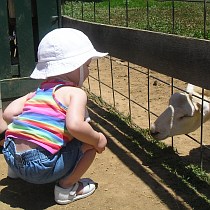-
(单词翻译:双击或拖选)
Washington
03 August 2007
There's a period in the development of toddlers when they seem to learn a new word every day. There are different theories about why young children undergo what experts call a word spurt1. But one psychologist believes it may have to do with how young children learn difficult words. VOA's Jessica Berman reports.
 |
Bob McMurray is a professor of psychology2 at the University of Iowa.
"And it would be very tempting3 to say, 'Wow, look at the rate of acquisition has sped up,' right? 'It took them a year to learn mommy but only a month to learn daddy.' But in actuality that child was probably working on that word daddy all along. They really spend a year and a month to learning the word daddy," he explained.
McMurray says once toddlers begin speaking their first few words, it is only a matter of time before they seem to learn words at a faster rate. According to the psychologist, the first word spurt usually occurs around 18 months of age.
 |
| A toddler learns the word for 'sheep' |
But according to a computer model McMurray created, toddlers have "word spurts5" after they have gathered enough easy, similar sounding words - like mama, dada, dog and cat. Once they have mastered these words, by repeating them over and over again, they then tackle more difficult words. McMurray says the exposure to more difficult words is a key factor in the word spurt.
"The critical factor is actually how many words are hard and how many words are easy. So, as long as you have, and this is what we were able to prove mathematically, more difficult words than easy words, you're always going to get some kind of acceleration6 in word learning," he added.
 |
"Kids are keeping track of lots and lots of words at the same time," he explained. "They may not be using all of the words they've learned, but as they are hearing words, they are soaking [them] up. They are not waiting until they are done learning one word before moving on to the next."
The study on toddlers' word development is in the journal Science.
 收听单词发音
收听单词发音
1
spurt

|
|
| v.喷出;突然进发;突然兴隆 | |
参考例句: |
|
|
|
2
psychology

|
|
| n.心理,心理学,心理状态 | |
参考例句: |
|
|
|
3
tempting

|
|
| a.诱人的, 吸引人的 | |
参考例句: |
|
|
|
4
specialized

|
|
| adj.专门的,专业化的 | |
参考例句: |
|
|
|
5
spurts

|
|
| 短暂而突然的活动或努力( spurt的名词复数 ); 突然奋起 | |
参考例句: |
|
|
|
6
acceleration

|
|
| n.加速,加速度 | |
参考例句: |
|
|
|















